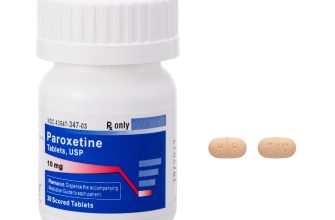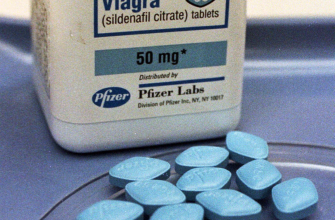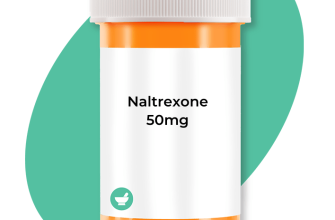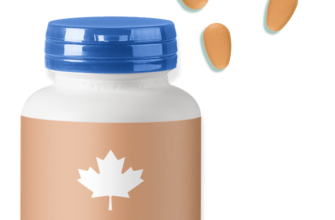If you are considering prednisone as a treatment option while managing bipolar disorder, consult your healthcare provider immediately. This corticosteroid can affect mood stability and may exacerbate symptoms in some individuals. Prioritize transparent conversations with your doctor about your mental health history and current medications.
Researchers have noted a connection between corticosteroid use and mood fluctuations. Some patients report heightened anxiety or depressive episodes during treatment with prednisone. Monitor your mood closely and keep a journal to track any changes you experience. This practice helps your healthcare provider make informed decisions about adjustments in your treatment plan.
Additionally, stay informed about potential side effects of prednisone that could influence your mental state. Increased appetite, sleep disturbances, and irritability are common. Discuss these symptoms with your healthcare team, as they can offer strategies to mitigate these effects. Proactive management can lead to a better experience during your treatment.
Building a supportive environment is also crucial. Engage with friends, family, or a therapist who understands bipolar disorder. Their support can help you navigate the complexities of your condition while undergoing prednisone therapy. Always prioritize your well-being and foster connections that enhance your mental health during this time.
- Prednisone and Bipolar Disorder
- Understanding Bipolar Disorder Symptoms and Diagnosis
- The Role of Prednisone in Treating Inflammatory Conditions
- Mechanism of Action
- Common Uses
- Link Between Prednisone Use and Mood Disorders
- How Prednisone Affects Neurotransmitter Levels
- Cortisol and Neurotransmitter Interaction
- Serotonin and Dopamine Levels
- Clinical Studies on Prednisone and Bipolar Disorder
- Impact on Mood Stability
- Recommendations for Clinicians
- Managing Bipolar Disorder Symptoms While on Prednisone
- Communicate Openly with Your Doctor
- Incorporate Lifestyle Adjustments
- Potential Side Effects of Prednisone in Bipolar Patients
- Alternative Treatments for Inflammation in Bipolar Patients
Prednisone and Bipolar Disorder
Prednisone can affect mood and mental health in individuals with bipolar disorder. Patients should monitor any mood swings closely while on this medication. Healthcare providers often recommend regular mood assessments to track changes.
Some studies indicate that corticosteroids, like prednisone, may trigger manic or depressive episodes. It’s advisable to discuss potential risks with a doctor before initiating prednisone treatment. It may be beneficial to adjust the bipolar disorder treatment plan concurrently with corticosteroid therapy.
Staying in communication with healthcare providers plays a key role in effectively managing symptoms. If mood changes occur, adjustments to the dosage or an alternative treatment may be necessary. Always inform providers about any existing mental health conditions prior to starting prednisone.
Employing coping strategies, such as therapy, can offer additional support while managing both bipolar disorder and the side effects of prednisone. Consider seeking support groups or professional guidance tailored to those facing similar challenges.
In summary, careful monitoring, open communication with healthcare providers, and proactive mental health strategies can help manage the complexities arising from the combination of prednisone and bipolar disorder.
Understanding Bipolar Disorder Symptoms and Diagnosis
Identifying bipolar disorder requires a keen observation of symptoms and a thorough assessment by a mental health professional. Notice sudden mood shifts, including extreme highs (mania or hypomania) and lows (depression). Mania might include feelings of euphoria, increased energy, reduced need for sleep, or impulsive behavior. On the other hand, depressive episodes often present with feelings of sadness, hopelessness, fatigue, and a lack of interest in activities.
Keep track of the duration and intensity of these mood changes. If highs last for at least a week and are severe enough to disrupt daily functioning, or if depressive episodes persist for an extended period, a professional evaluation is warranted.
Diagnostic criteria outlined in the DSM-5 include a history of manic or hypomanic episodes for a diagnosis of Bipolar I, while Bipolar II requires at least one major depressive episode and at least one hypomanic episode. Mental health practitioners often utilize standardized mood charts and personal history to make an informed diagnosis.
Don’t hesitate to share your experiences regarding mood fluctuations and other symptoms during consultations. A comprehensive view helps in making accurate assessments. Family history of mood disorders may also play a role in diagnosis, as genetics can influence susceptibility to bipolar disorder.
Engagement in consistent treatment, which may include therapy and medication, significantly improves quality of life. Establish a supportive network and consider psychoeducation to better understand the disorder and manage symptoms effectively.
The Role of Prednisone in Treating Inflammatory Conditions
Prednisone acts as a powerful anti-inflammatory medication, commonly prescribed for a variety of conditions such as arthritis, asthma, and autoimmune diseases. Its ability to suppress the immune response enables it to reduce inflammation effectively. Physicians often recommend tapering dosages to avoid potential withdrawal symptoms, ensuring that patients adjust their treatment as needed.
Mechanism of Action
This corticosteroid functions by inhibiting the production of inflammatory substances in the body. It alters gene expression, which leads to decreased synthesis of cytokines and other mediators involved in inflammation. As a result, patients generally notice a reduction in swelling, pain, and discomfort associated with their conditions.
Common Uses
Prednisone is frequently used to manage conditions such as:
| Condition | Description |
|---|---|
| Rheumatoid Arthritis | Reduces joint inflammation and pain. |
| Asthma | Alleviates airway inflammation and improves breathing. |
| Allergic Reactions | Controls severe allergic responses and hives. |
| Lupus | Helps manage systemic inflammation in autoimmune disorders. |
Patients often report significant relief and improvement in quality of life after beginning treatment with prednisone. Regular monitoring by healthcare professionals ensures that the dosage remains appropriate and minimizes risks of side effects such as weight gain and increased blood sugar levels.
Link Between Prednisone Use and Mood Disorders
Patients taking prednisone may experience significant mood changes, including increased anxiety, irritability, or depressive symptoms. Monitoring your mood closely while on this medication is crucial.
Prednisone, a corticosteroid, can affect neurotransmitter levels in the brain. Understand the following connections:
- Neurotransmitter Disruption: Corticosteroids can alter serotonin and dopamine levels, which are critical for mood regulation.
- Physical Symptoms: Side effects like insomnia, weight gain, or fatigue can negatively impact mental health.
- Withdrawal Effects: Abruptly stopping prednisone may lead to mood swings, anxiety, or depressive episodes.
Take proactive measures to manage mood changes:
- Regular Check-ins: Schedule frequent appointments with your healthcare provider to discuss mood changes.
- Medication Readjustment: Your doctor may adjust your prednisone dosage or switch medications to minimize mood disturbances.
- Mental Health Support: Consider therapy options to cope with psychological changes and develop healthy coping strategies.
- Healthy Lifestyle Choices: Engage in regular physical activity, maintain a balanced diet, and practice good sleep hygiene to support overall well-being.
Open communication with your healthcare provider can help you navigate the complexities of prednisone use and its impact on mood disorders. Addressing these concerns early can facilitate more effective mood management.
How Prednisone Affects Neurotransmitter Levels
Prednisone significantly influences neurotransmitter levels, particularly by affecting cortisol production and altering neurotransmitter balance. Patients can experience changes in serotonin and dopamine due to the impact of corticosteroids on the central nervous system.
Cortisol and Neurotransmitter Interaction
Increased cortisol from prednisone can lead to elevated levels of norepinephrine, which often contributes to mood changes. This may heighten anxiety or depressive symptoms in individuals with bipolar disorder. Monitoring cortisol levels can help manage these effects and adjust treatment accordingly.
Serotonin and Dopamine Levels
Prednisone can also disrupt serotonin pathways. This may result in decreased serotonin production, linking to mood swings or depressive episodes. Additionally, the drug might cause alterations in dopamine synthesis, which could exacerbate manic symptoms. Healthcare providers should consider these factors when prescribing prednisone, especially for patients with a history of mood disorders.
Always consult a healthcare professional when addressing changes in mood or behavior while on prednisone. Adjusting therapy or medication can lead to improved outcomes and better management of symptoms related to bipolar disorder.
Clinical Studies on Prednisone and Bipolar Disorder
Recent clinical studies reveal a complex relationship between prednisone and bipolar disorder. Some research indicates that corticosteroids like prednisone may exacerbate mood episodes in individuals already diagnosed with bipolar disorder. A study published in the Journal of Affective Disorders found that patients using prednisone exhibited an increase in manic symptoms, emphasizing careful monitoring and management of mood stability during corticosteroid treatment.
Impact on Mood Stability
Analysis from a longitudinal study highlights that patients treated with prednisone often experienced a higher frequency of manic episodes compared to those not on corticosteroid therapy. This study suggests that clinicians should weigh the risks of mood destabilization against the benefits of prednisone for treating coexisting medical conditions. Collaborative decision-making is key, ensuring that patients understand potential risks to their mental health.
Recommendations for Clinicians
Clinicians should conduct thorough assessments of mood history before initiating prednisone treatment in bipolar disorder patients. Regular follow-ups to monitor mood changes are advisable. If a patient presents with acute mania, consider adjusting the corticosteroid dosage or exploring alternative treatments. Altering the treatment plan can help mitigate the psychiatric effects while addressing the underlying medical issues.
Managing Bipolar Disorder Symptoms While on Prednisone
Monitor your mood closely while taking prednisone. Track daily changes in your emotional state, energy levels, and overall well-being. This practice aids you and your healthcare provider in adjusting your management plan as needed.
Communicate Openly with Your Doctor
Inform your doctor about any mood fluctuations or side effects you experience while on prednisone. Discuss how the medication affects your bipolar disorder symptoms. This partnership enhances tailored treatment strategies, like dosage adjustments or alternative therapies.
Incorporate Lifestyle Adjustments
Establish a routine that includes regular exercise, a balanced diet, and adequate sleep. Physical activity can help stabilize mood and reduce stress. Include omega-3 fatty acids in your diet, as they may support mood regulation. Prioritize sleep quality to minimize mood disruptions, as sleep issues can exacerbate bipolar symptoms.
Engage in mindfulness or relaxation techniques. Practices such as yoga, meditation, or deep-breathing exercises promote emotional stability. Find supportive networks, such as therapy groups, to share experiences and coping strategies with others facing similar challenges.
Consider minimizing caffeine and alcohol intake. Both substances can interfere with mood stability and prednisone effectiveness. Remember to stay hydrated throughout the day to support overall health.
Be patient with yourself. Adjusting to prednisone while managing bipolar disorder can require time. Accept support from loved ones and professionals to navigate this complex landscape together.
Potential Side Effects of Prednisone in Bipolar Patients
Proceed with caution when using Prednisone in bipolar patients due to its possible side effects that may aggravate mood disorders. Here are key side effects to monitor closely:
| Side Effect | Description | Recommendations |
|---|---|---|
| Insomnia | Prednisone can disrupt sleep patterns, leading to difficulty in falling or staying asleep. | Encourage good sleep hygiene practices and consult a physician if insomnia persists. |
| Mood Swings | Increased irritability or rapid changes in mood can occur, potentially triggering manic or depressive episodes. | Regular monitoring of mood is essential. Adjust dosages or explore alternatives if necessary. |
| Anxiety | Medication may heighten anxiety levels, causing increased restlessness or tension. | Consider incorporating relaxation techniques or discussing anxiety management strategies with a therapist. |
| Weight Gain | Weight changes may happen due to increased appetite or fluid retention. | Implement dietary adjustments and encourage physical activity to mitigate weight gain. |
| Psychosis | In rare cases, Prednisone may induce psychotic symptoms, including hallucinations. | Seek immediate medical attention if severe symptoms appear. Reevaluate medication with a healthcare provider. |
Continuous communication with healthcare providers remains critical. Customize management plans to address the unique needs of bipolar patients receiving Prednisone. Regular follow-ups will help to assess mood stability and medication efficacy.
Alternative Treatments for Inflammation in Bipolar Patients
Consider integrating omega-3 fatty acids into your diet. Studies indicate these fatty acids can reduce inflammation and support mood stabilization.
- Sources: Fatty fish like salmon, walnuts, flaxseeds.
- Dosage: Aim for 1,000 to 2,000 mg per day.
Turmeric is another powerful anti-inflammatory option. Curcumin, its active compound, may have mood-lifting properties.
- How to use: Incorporate it into meals, or consider a supplement with a dosage of 500 to 2,000 mg per day.
- Tip: Pair with black pepper to enhance absorption.
Wind down with mindfulness meditation. Research shows this practice reduces inflammation markers and helps manage mood swings.
- Set aside 10-20 minutes daily.
- Choose a quiet space.
- Focus on your breath or a calming mantra.
Explore probiotics, as gut health plays a role in mental well-being. Probiotics can help maintain balance and reduce systemic inflammation.
- Sources: Yogurt, sauerkraut, and kefir.
- Dosage: 1-10 billion CFUs daily, depending on specific products.
Consider incorporating regular exercise into your routine. Physical activity boosts endorphins while reducing inflammation and stress levels.
- Recommended activities: Walking, cycling, or yoga.
- Frequency: Aim for at least 150 minutes of moderate-intensity activity weekly.
Consult with a healthcare provider before making significant dietary or lifestyle changes. This ensures treatments align with overall health strategies tailored to bipolar disorder.










